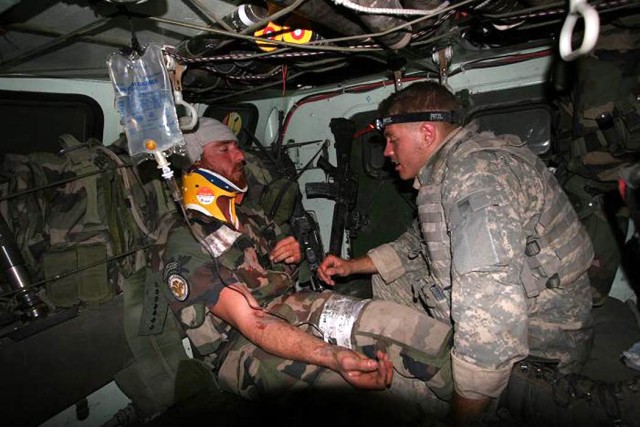BAGRAM AIRFIELD, Afghanistan (Army News Service, March 10, 2008) - As a convoy of more than 20 vehicles snaked its way through a creek bed in Tag Ab Valley Nov. 10, small arms and rocket-propelled- grenade fire interrupted the patrol's five-day mission of searching for high-value targets in Kapisa Province.
Spc. Nicholas Colgin, a medic with Bravo Company, Division Special Troops Battalion, 82nd Airborne Division, heard the call for "medic" and responded by running through sporadic enemy fire to a wounded French soldier. Hospital officials later said Colgin's actions ultimately saved the French soldier's life.
"All of a sudden, we started taking fire and we would return fire and then it would stop; it would go on like this for more than an hour as the sun went down," said Colgin.
The convoy was pushing through the intermittent ambushes when Colgin said he noticed a French vehicle passing his Coalition Humvee from the trail position moving alongside the lead Armored Security Vehicle.
"They were trying to notify the lead vehicle of an injury, their gunner took a 7.62 round through the helmet," Colgin, a Chesterfield, Va., native said. "When the lead vehicle called for a medic, I stopped the Humvee I was driving, hopped out and the [Radio Telephone Operator] in the back (seat) tossed me the aid bag."
As the convoy was still under attack from enemy fire, Colgin ran in the open past five vehicles reaching the French vehicle jumping up and down waving his arms screaming "I'm a medic!"
"I wasn't thinking much at all when I left the Humvee -- I got caught up in the moment," Colgin recalled. "I did know I had to move fast to help whoever it was."
Colgin said the French soldiers didn't speak English and were surprised at first seeing an American Soldier out in front of their door during an ambush but eventually they let him in.
"I had no idea what his injuries were; he was sprawled out in the back of the vehicle with loose bandages on his head and was unresponsive," Colgin explained. "I positioned him properly and started treating him and that meant stopping the bleeding."
Colgin asked if anyone spoke English in the French vehicle because they were trying to talk to Colgin while he was treating their comrade. When he asked, they pointed to the guy with the bandage on his head.
"It was crazy because I'm trying to help the soldier and all I hear is French. The gunner would fire off some rounds, pop down to try and talk to me and then pop back up and fire more rounds," Colgin said. "I'm pretty sure this guy was going to die, I knew we had to get him out fast or he wouldn't make it."
According to Colgin, the French vehicle did not have communications with the Coalition vehicles so he stuck his head out one of the gunner's turrets and began yelling the extent of Sabastian's injuries to the lead ASV.
"There was so much going on I decided to run back to the commander's Humvee to give (Medical Evacuation) information and a [Situation Report] while avoiding the small-arms fire," Colgin said. "I then ran back a second time to the French vehicle and gave him an IV and further assessed his injuries. Once I was able to push him with fluids and stop the bleeding he became responsive."
Colgin would stay with his patient through the sporadic ambushes, reassuring Sabastian he would be make it while firing his weapon through the gunner's turret Sabastian occupied. What was normally a 20-minute drive to reach Forward Operating Base Kutschbach took the convoy three hours, according to Colgin.
Sabastian was medically evacuated and diagnosed with a skull fracture and brain swelling. Hospital officials who treated Sabastian said Colgin's action's saved his life.
"Simple stuff saved him like stopping the bleeding and pushing fluids," said Colgin. "The reassuring didn't hurt either."
(Sgt. Timothy Dinneen serves with CJTF-82 Public Affairs.)


Social Sharing